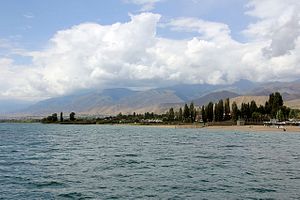A member of Kyrgyzstan’s parliament proposed banning the publication of bad news in Russian and on the internet in order to attract foreign tourists to the country.
According to 24.kg, Bir Bol deputy Akylbek Japarov made the suggestion during a parliament session and cited a recent trip to Georgia where, he claimed, he didn’t see any bad news.
Japarov said that was by design: “It turned out that in 2004 the President of Georgia addressed the people and said: ‘Let’s write something bad in Georgian, and good in Russian and English.”
“And do you read our websites?” he went on. “There is news that a 92-year-old grandmother was raped. And it will be there for a week. Therefore, the minister must make an appeal. We need to praise the good and hide the bad.”
Kloop, aKyrgyz media outlet, cheekily posted an article titled “In Kyrgyzstan, everything is good (Material specifically for deputy Japarov).” The piece contained a series of links to good news articles and running commentary.
There’s Jyldyz, a woman who has been knitting since she was 11 near Kochkor and won a contest in May. “Surely this competition will attract a lot of tourists…”
Then there’s the news that rare birds can be found in Kyrgyzstan, surely enticing “millions of tourist photographers” to rush to Kyrgyzstan, Kloop comments. The linked article mentions “more than 20 flamingos in Issyk-Kul.”
The final story was about the completion of a fiber optic line to China, opening the way for access to high-speed internet via China. “But imagine how happy the tourists will be when they find out that in Kyrgyzstan you can now surf the internet through China (where everything is fine too).”
The Kloop article is satire at its finest, exposing the absurdity of Japarov’s proposal with its mocking tone overlaid on very real news articles. Not reporting on “bad news” stories doesn’t make them go away. Meanwhile, solid reporting on difficult situations brings to light matters like corruption — which do turn tourists off from visiting a place — and uncovers issues the government ought to address.
Furthermore, Kyrgyzstan has and continues to pursue better options to increase the number of tourists coming to the country. A central thrust in this effort has been the visa-free regime put in place in 2012. The issue came up for discussion recently as the existing law extends only to 2020. Under consideration is not only an extension of the law to 2030, but the addition of 10 more countries to the list (bringing it to 55 countries) and the extension of the visa-free stay period from 60 to 120 days.
According to state statistics, since 2011, the stream of tourists to Kyrgyzstan has increased gradually (with a small dip in 2013). In 2017, more than 1.3 million tourists visited Kyrgyzstan (in 2011, it was just over 800,000). Tourism’s share in GDP in 2017 reached a peak of 4.8 percent. It’s believed that the majority of tourists to Kyrgyzstan come from the former Soviet Union — 50 percent from Kazakhstan, a third from Russia and much less from European countries and elsewhere.
There has been some pushback to opening Kyrgyzstan’s doors and some wayward policies. A notable hiccup in late 2016 saw a law passed requiring all foreign visitors to register within 5 days of arrival, essentially nullifying the attractiveness of a visa-free regime. After a backlash, the law was revised.
Ultimately, it won’t be the lure of overly saccharine news that draws in visitors to Kyrgyzstan. Instead, simplifying procedures, improving infrastructure, and providing experiences tourists are seeking will bring them in. That would be the real good news.

































